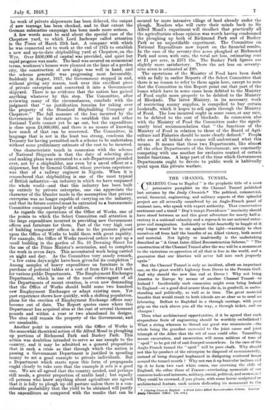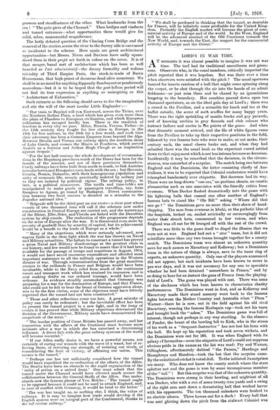THE CHANNEL TUNNEL.
elHARING Cross to Bagdad " is the prophetic title of a most persuasive pamphlet on the Channel Tunnel published last autumn by the Daily Chronicle.' The political, commercial, social, financial, engineering, and military aspects of this splendid project are all severally considered by an Anglo-French panel of
eminent men, who speak with expert authority. That conservative sentiment and a timid " Don't-tempt-Providence " insularity should have stood between us and this great adventure for nearly half-a- century is a national calamity and a reproach to our national enter- prise and imagination. Indolently or faint-heartedly to boggle at it any longer would be to sin against the light—wantonly to shut ourselves off from half the benefits of an Allied victory, both moral and material. Not lightly or inadvisedly is the undertaking
described as "A Great Inter-Allied Reconstruction Scheme." "The construction of the Channel Tunnel after the war will be a monument to the victorious co-operation of all that is free in the world, and a guarantee that our liberties will never fall into such jeopardy again."
But the Channel Tunnel is only an incident, albeit an important one, on the great world's highway from Dover to the Persian Gulf. And why should' the new line end at Dover ? Why not bring America to Europe by means of another Channel Tunnel—to Ireland ? Incidentally such connexion might even bring Ireland to England—or a good deal nearer than she is, in goodwill, in under- standing and politically, as well as in time. The great material benefits that would result to both islands are so clear as to need no labouring. Belfast to Baghdad in a through carriage, with your grip on the rack above you all the way, a through ticket, and no changes !
Then what architectural opportunities, if it be agreed that such
stupendous feats of engineering should be worthily embellished ! What a string whereon to thread our great war monuments—the whole being the grandest memorial to the joint cause and joint triumph of the Allies that the wit of man could offer. Tunnelling means excavation, and excavation will mean millions of tons of " spoil " to be got rid of and dumped somewhere. In the case of the Anglo-French tunnel the " spoil " will be pure chalk. Why should not this by-product of the enterprise be disposed of monumentally, instead of being dumped haphazard in disfiguring scattered heaps around the tunnel mouth ? Why not run it up funicular inclines and tip it to form two vast white cones, one crowning the cliffs of England, the other those of France—everlasting memorials of our common tasks and interests, military, social, political, and economic They could be crowned, if you please, with some heroic sculptural or architectural feature, each nation dedicating its monument to the • Charing Cross to Bagdad • a Great Inter-dliied Reconstruction Scheme. London' Daily Chronicle Office. [5e. net.]
prowess and steadfastness of the other. What landmarks from the sea ! " The gate-piers of the ChanneL" Then bridges and viaducts and tunnel entrances—what opportunities these would give for solid, sober, monumental magnificence.
The hotly debated question of the Charing Cross Bridge and the removal of the station across the river to the Surrey side is canvassed as incidental to the scheme. Here again are great architectural opportunities—but Messrs. Niven and Davison have sadly squan- dered them in their projet set forth in colour on the cover. It is of that meagre, banal sort of architecture which has been so well branded as Part administralif—the dreary formality and tedious triviality of Third Empire Paris, the stock-in-trade of Baron Haussmann, that high-priest of decorous dead-alive monotony. We shall be in no mood for anything flippantly flamboyant or ponderously mausolean—but it is to be hoped that the poet-bellum period will not find its true expression in anything so uninspiring as this " Architecture of Exhaustion."
Such extracts as the following should serve to fire the imagination and stir the will of the most insular Little Englander :-
" Our train to Bagdad will run Eastward, across the Ticino, over the Northern Italian Plain, a land which has given even more than
the plain of Flanders to European civilisation, and which European militarism has ravaged hardly less. There is the tradition of freedom in every city we pass. Milan, Brescia, Verona, Padua—in the 12th oentury they fought for free cities in Europe, in the 19th for free nations, in the 20th for a free world, and each time their adversary has been a German Emperor from beyond the Alps.
Between Brescia and Verona our railway skirts the southern shore of Lake Garda, and crosses the Mincio at Peschiera, which served Austria as a fortress and Arthur Hugh Clough as an inspiration against despair."
"For the last half-century the whole development of communica- tions in the Hapsburg provinces south of the Drave has been for the benefit of the interior, and not of these provinces themselves. Costly railways have been built from north to south, to link Austrian manufactories and Hungarian corn-lands with the sea ; but Slovenia, Croatia, Bosnia, Dalmatia, with their homogeneous Fopulation and
unity of economic life, remain practically isolated by railway just as they are isolated by political regime. The railway policy, in
fact., is a political manoeuvre. The tariffs and time-tables are manipulated to make goods or passengers travelling, say, from Sarajevo to Agram, go round by Budapest. Direct communica- tion between two local centres is dreaded as a stimulus to the Jugoslav national idea."
" Belgrade will be the third port on our route—a river port where vessels of two thousand tons will call if the schemes now wider
consideration in Central Europe are carried out, and the waterways of the Rhine, Elbe, Oder, and Vistula are linked with the Danubian system by shit-canals. The realisation of this programme depends on the state o Europe after the war. It is threatened even more by poverty of goodwill than by scarcity of capital, but its achievement would be a benefit to the trade of Europe as a whole."
" Many of the objections, which were seriously advanced, now appear futile in the clear light which the war has thrown on Naval and Military actualities. The failure to construct a tunnel has proved a gross Naval and Military disadvantage at the greatest crisis in our history, and few would now be found to assert that if it had been available for the passage of troops and munitions in August., 1914, it would not have saved enormous expenditure and afforded most important assistance to all the military operations in the Western theatre of war. Through communications from the great munition centres to the railheads in France and Belgium would have been invaluable, while to the Navy relief from much of the continuous escort and transport work which has strained its resources, and is now making drafts on our reduced tonnage, would have been welcome. As evidence steadily accumulated that Germany was preparing for a war for the domination of Europe, and that France, who could not be left to bear the brunt of German aggression alone, was to be the first victim, some of the objectors must have bitterly regretted that the tunnel had not been constructed."
" These and other reflections come too late. A great mistake of policy can rarely be redeemed ; but the inevitable effect has been to present the tunnel project in a new light, and in the irony of events it has proved that while Military objections determined the decision of the Government, Military needs have demonstrated the magnitude of the error."
" The insular position of Great Britain has passed away, and her connection with the affairs of the Continent must become more intimate after a war in which she has exercised a determining influence. A direct link with tho great railway systems of the world will become essential."
" If our Allies really desire it, we have a powerful means, not certainly of curing our wounds with the wave of a wand, but of re- lieving them, of restoring our strength, of resisting our rivals, of consolidating the fruit of victory, of affirming our union. This means is the tunnel."
" Perhaps one has not sufficiently considered how the tunnel would have expedited the co-ordination of the efforts of the Allies. The Straits have been an obstacle to the rapid organisation of the 'unity of action on a united front.' One must admit that the tunnel under the Channel would have effected much sooner the collaboration between the General Staffs of the Allies. One under- stands now the famous phrase of Von Moltke : ' The tunnel ought to be opposed because it could not be used to attack England, and, in case of conflict with Germany, it wound be fatal to the latter.' "
"The war has taught us, as nothing else, I think, the value of railways. It is easy to imagine how trade would develop if the English system were an integral part of the Continental, thanks to sul,:trtrine railway." " We shall be pardoned in thinking that the tunnel, so desirable for France, will be infinitely more profitable for the United King- dom. Probably the English market will become the pivot of com- mercial activity of Europe and of the world. In the West, England will be the advanced sentinel of the Old Continent towards the New World, and, towards the East, the magnet for the commercial activity of Europe and the Orient."











































 Previous page
Previous page